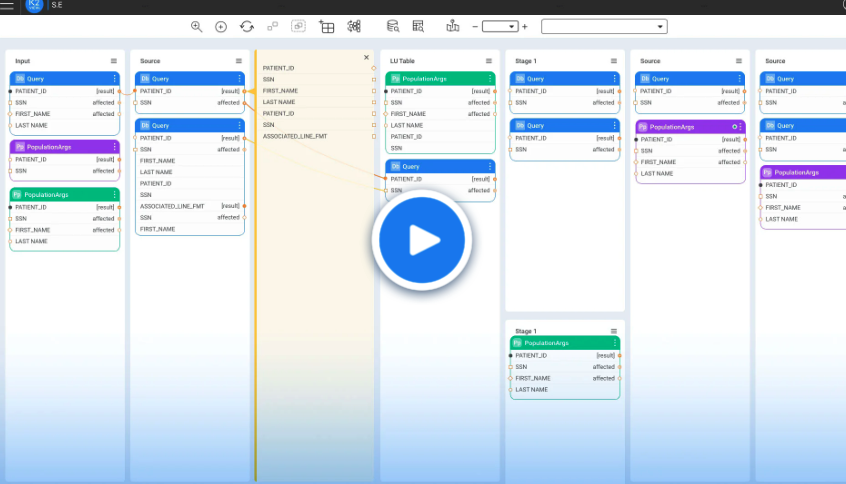With so many synthetic data companies on the market, this guide will help you understand which factors to consider and prioritize when choosing a partner.
What is Synthetic Data?
Synthetic data generation refers to the creation of artificial data that closely mimics the statistical properties and structure of real data. Enterprises that use synthetic data bypass the need to go through extensive data masking procedures in order to protect sensitive or Personally Identifiable Information (PII).
Using synthetic data is a safe alternative to using real production data and can greatly accelerate the rate of testing and development, enabling enterprises to move more agilely without putting their users’ privacy at risk.
Benefits of Using Synthetic Data Generation Tools
Synthetic data generation tools offer many benefits for organizations. They enable the creation of large datasets that would be challenging to achieve using production data alone. They also give teams the ability to identify issues and make improvements without waiting for access to real production data. This scalability facilitates robust system validation at a faster rate.
Aside from speed and scalability, synthetic data can also be more reliable. Real production data often faces quality issues, like errors, duplications, or other gaps, which makes it less than ideal for testing. Synthetic data is also suitable for boundary, negative, load, and progression testing when production data is unavailable or no test data exists. Synthetic data tools produce the perfect blend of data quality, variety, and balance. They can automatically fill in missing values, erase duplications, apply labels, and unify data from multiple sources (often in multiple formats).
Synthetic data generation tools are also helpful for training Machine Learning (ML) models. They provide a closed environment where models can learn and improve without relying on extensive real-world data collection.
Choosing the Right Synthetic Data Company
There are a variety of different synthetic data creation companies and tools on the market today. Given that this is likely to be a long-term partnership for your organization – and one that will have an outsized impact on your data teams’ ability to test software and train Machine Learning (ML) models more efficiently – it’s critical to consider the following, in order of priority:
-
Support for the key data generation techniques
When evaluating synthetic data companies, prioritize those that have these 4 techniques built into their tools:
-
Generative AI, which learns the distribution of real-life data to generate similarly distributed synthetic data.
-
Rule-based generation, which fabricates synthetic datasets based on user-defined business rules. Data teams can add intelligence to the synthetic data that’s been created by referencing the relationships between the different data elements, thus assuring the relational integrity of the generated data.
-
Entity cloning, which collects data from all the source systems of a single business entity (e.g., customer) and obfuscates it to comply with privacy laws. It then clones the entity, establishing separate identifiers for each cloned entity to assure uniqueness.
-
Data masking, which substitutes structurally similar fake data for sensitive or Personally Identifiable Information (PII).
-
-
Data privacy and security
Look for synthetic data companies that prioritize data privacy and security by design. Ensure that their methods of standard and test data masking, noise addition, or other privacy measures meet your organization's standards and compliance needs.
-
Data accuracy, quality and reliability
It’s important to evaluate any tool's capabilities in maintaining data integrity and distribution accuracy, and seek out synthetic data companies that maintain relational integrity in order to better preserve data consistency. Additionally, solutions that offer the ability to emulate distributed values in real source data will give you a better ability to segment and sort through data down the road.
-
End-to-end solution
Data generation is a single step within the synthetic data management lifecycle. A comprehensive synthetic data management solution should address the entire lifecycle from source to target, including data preparation tools to extract and mask the data, and tools data consumers can use to control data usage and versioning, loading and reserving, rollback, and other functions.
-
Integration, automation and compatibility
The tool you choose should seamlessly integrate with your existing data infrastructure, databases, and test automation pipelines. For example, if you’re involved in software testing, find a synthetic test data solution that can be built into your test data management tools. This will help you avoid dealing with the costs of multiple solutions and implementations down the line.
-
Agility
The solution you choose needs to empower data consumers, such as testers and data scientists, with self-service tools to control and manage the data generation process – including the ability to set up rule-based parameters, reserve data for individual users (to prevent overrides), enable version management, and roll back synthetic datasets.
-
Scalability
As the needs of your organization grow and change, the synthetic data generation solution you select should be able to accommodate larger datasets and more diverse use cases. Additionally, knowing how to create synthetic data on your own (via a self-service portal) will keep you agile as you grow.
Top 6 Synthetic Data Companies for 2023
Keeping these considerations in mind, here are the top 6 synthetic data solutions on the market today:
-
K2View
K2View has become the leading synthetic data company by introducing end-to-end management of the synthetic data lifecycle, including subsetting, pipelining, and synthetic data operations. It stands alone in leveraging all 4 key generation techniques.
-
Gretel
Gretel offers a synthetic data platform targeted to developers and ML/AI engineers, who use the platform's APIs to generate anonymized and safe synthetic data while preserving data privacy.
-
MOSTLY AI
The MOSTLY AI synthetic data platform enables enterprises companies to unlock, share, fix, and simulate data. Although similar to actual data, its synthetic data retains valuable, granular-level information, while assuring private information is protected.
-
Syntho
The Syntho AI-based engine generates a new artificial dataset that mimics the statistical characteristics of the original data. It allows users to maximize data utility, minimize privacy risk, and promote innovation through data sharing.
-
YData
YData's data-centric platform enables the development and ROI of AI solutions by enhancing the quality of training datasets. Data teams can use automated data quality profiling and improve datasets, leveraging state-of-the-art synthetic data generation.
-
Hazy
Hazy models generate high quality synthetic data using a differential privacy mechanism. Data can be tabular, dispersed (through several tables in a relational database), or sequential (containing time-dependent events, like bank transactions).
Of All Synthetic Data Companies, 1 Stands Out
Addressing the many different synthetic data examples, there's only one solution – based on business entities, like customers, invoices, or devices – that can assure that all the relevant data for each entity is consistent and contextually accurate. Not only does it enforce referential integrity, but it automatically discovers and classifies the business entity data model, or blueprint.
The blueprint enables you to generate fake data, regardless of the synthetic data generation method used (individually or in combination with each other), be it:
- Generative AI, which creates lifelike, synthetic data using machine learning algorithms.
- Rules engine, which generates synthetic data using pre-defined business rules.
- Entity cloning, which assembles all business entity data, obfuscates it, and then replicates it.
- Data masking hides sensitive data and personal information to generate realistic, privacy-compliant data.
K2view is the only company with entity-based synthetic data generation tools that support the entire synthetic data management lifecycle end to end.















